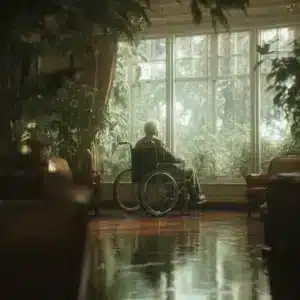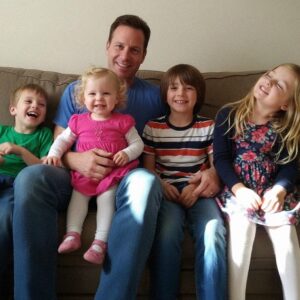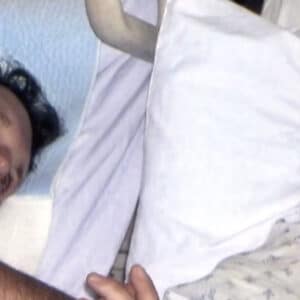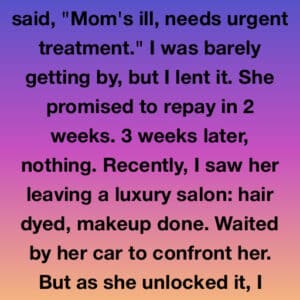I got pregnant far too young, and when I told my boyfriend, Daniel, he vanished as if someone had flipped a switch. No calls. No apologies. Nothing. I raised my son, Elias, on my own — through sleepless nights, diner shifts, and every scraped knee and science project in between. He grew into a responsible, brilliant, athletic kid who worked part-time and still kept straight A’s. I thought our quiet little world was set.
Then one afternoon, the doorbell rang.
A woman stood there clutching a tin of cookies like she was about to deliver Christmas magic. Her scarf was crooked, her lipstick loud, and her eyes full of tears she hadn’t quite let fall.
“My dear grandson,” she breathed, looking at Elias as if he held the sun in his hands.
I froze. “…I’m sorry, who?”
“I’m Nora,” she said gently. “His grandmother.”
Elias blinked at her, confused. He didn’t know her. I didn’t know her.
“You must be mistaken,” I told her. “Your son left the second I said I was pregnant. He hasn’t spoken to me in seventeen years.”
She went painfully still. “He told me… you lost the baby.”
Elias inhaled sharply. I put a hand on his shoulder. “Well, clearly not. This is Elias. And Daniel lied.”
She didn’t argue. Didn’t defend him. She just trembled and asked if she could talk to us.
Something in her expression — the shock, the grief, the genuine ache — made me let her inside.
We sat in the living room. Elias watched her the way someone watches a stranger who knows their name: politely, but with boundaries.
“I always wanted grandchildren,” she whispered. “But Daniel said his girlfriend miscarried and left him. I didn’t know anything about you. I didn’t even know your name.”
“I didn’t leave,” I said. “I was seventeen. He disappeared. I worked, studied when I could, and raised Elias alone.”
Elias stayed quiet, listening to every word.
“I’d like to know him,” she said softly. “If he’ll let me.”
Elias gave a small nod. “Maybe we can meet at the park first.”
It wasn’t much, but it was enough.
From then on, Nora showed up every week. A knitted scarf, muffins, a book she’d saved from when Daniel was young. She didn’t push. She listened. She asked about school, about track, about life. Slowly, Elias warmed to her. Carefully, so did I.
She brought an old photo once — Daniel at sixteen, mid-stride on a track. Elias studied it, then smirked. “Okay… we have the same jawline.”
Nora laughed, wiping her eyes. “Yes. You do.”
A month passed before Elias asked, “Do you think she really didn’t know?”
“I think she was lied to,” I said. “And I think she’s trying.”
Then everything tilted.
A friend from a legal office called. “Did you know Daniel filed for shared custody? He claims you never told him he had a son.”
I nearly dropped the phone.
Seventeen years of silence — now he wanted rights?
I told Nora. She went pale, promised she knew nothing, and left to confront him.
She came back red-eyed but resolute. “I told him this is unforgivable. And I’m siding with you.”
Court came quick. Daniel tried to spin a tragic story of being “robbed” of fatherhood. The judge didn’t buy it — not with his absence, not with Nora’s testimony, not with Elias himself saying he wanted no relationship.
The ruling: Elias got to choose. He chose no.
Life went on. Nora became part of our family in a way Daniel never tried to be. She came to track meets, celebrated birthdays with homemade cakes, taught Elias to sew a button and find good deals in thrift stores. We even had a quiet friendship of our own — two women who’d been hurt by the same man, finding something like peace together.
Then came the day she showed up looking fragile, her hands trembling.
“I’ve been diagnosed with a heart condition,” she said. “The surgery is risky. I just… wanted to tell you both.”
Elias sat on the porch that night, staring at the sky.
“She’s scared,” he whispered.
“She is,” I said. “But she’s strong too. Like you.”
He nodded. “I want to be there for her.”
And he was. Through the surgery, the recovery, the long slow healing. He held her hand when she drifted in and out of sleep. He installed a ramp for her wheelchair. He cooked her soup and read to her when she couldn’t focus.
Months later, she handed him a sealed envelope.
“Not until I’m gone.”
He tucked it away.
When she passed, Elias was twenty-one. He held her hand at the end, whispered that he loved her, and cried into my shoulder all the way home. Then he opened the envelope.
Inside was a letter—and a check big enough to make both of us sit down.
“I sold my house,” she’d written. “This is for your future. For school. For the life you will build. I love you, Elias. I’m so proud of you.”
He cried until he couldn’t anymore.
We used part of the money to start a tutoring program for kids from single-parent homes — his idea, inspired by every struggle we’d lived through and every gift Nora had given.
Her name is on the plaque at the front.
Daniel sent a message after her funeral. “I’m sorry about Mom.”
Elias didn’t respond. He didn’t need to.
Some people walk out. Some people show up.
Some love is conditional. Some isn’t.
The ones who stayed — that’s who our family became.





